イベント&アクティビティ
New issue of Contemporary Japan published
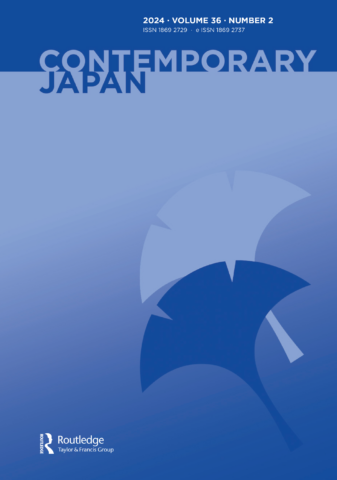
The new issue of Contemporary Japan (vol. 36, no. 2) features five research articles, the biennial 2023 VSJF award-winning paper, and a book review section. The research articles include an inquiry into the relevance and effectiveness of national apologies by Jane Munro; Ryotaro Takahashi addresses the relationship of income inequality and the size of the government in Japan; Ken Hijino analyzes the politics of depopulation in local elections; Silvia Croydon investigates the politics of inclusiveness in terms of consultation on disability policies; and Kristina Iwata-Weickgenannt and Aidana Bolatbekkyzy explore how foodscapes are invoked in critical commentary on the “capitalocene” in post-3.11 Japanese literature. The English translation of the VSJF award-winning paper by David Adebahr offers unprecedented access to the conversations and thought processes behind Japan’s security policy among key political actors in Japan. CJ’s book review section includes recent publications on religion and fundamentalism, the history of Kyoto, public discourse on fertility policies, and the use of robots in eldercare.
New open access article analyses impact of civic engagement on women’s well-being
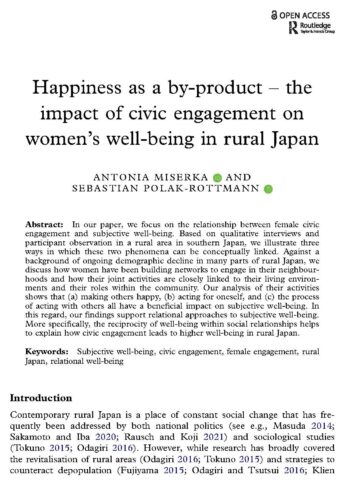 A new open access research article by Antonia Miserka (University of Vienna) and DIJ social scientist Sebastian Polak-Rottmann analyses the relationship between female civic engagement and subjective well-being. Their article “Happiness as a by-product – the impact of civic engagement on women’s well-being in rural Japan”, published in Japan Forum (online first), is based on qualitative interviews and participant observation in a rural area in southern Japan. The analysis shows that (a) making others happy, (b) acting for oneself, and (c) the process of acting with others all have a beneficial impact on subjective well-being. In this regard, the findings support relational approaches to subjective well-being. More specifically, the reciprocity of well-being within social relationships helps to explain how civic engagement leads to higher well-being in rural Japan. The article is an outcome of Sebastian’s research project Supplementing activities of resilience: The impact of demographic change on local activities and civic engagement.
A new open access research article by Antonia Miserka (University of Vienna) and DIJ social scientist Sebastian Polak-Rottmann analyses the relationship between female civic engagement and subjective well-being. Their article “Happiness as a by-product – the impact of civic engagement on women’s well-being in rural Japan”, published in Japan Forum (online first), is based on qualitative interviews and participant observation in a rural area in southern Japan. The analysis shows that (a) making others happy, (b) acting for oneself, and (c) the process of acting with others all have a beneficial impact on subjective well-being. In this regard, the findings support relational approaches to subjective well-being. More specifically, the reciprocity of well-being within social relationships helps to explain how civic engagement leads to higher well-being in rural Japan. The article is an outcome of Sebastian’s research project Supplementing activities of resilience: The impact of demographic change on local activities and civic engagement.
Hybrid lecture ‘Animals in Japanese Society’ with Barbara Holthus
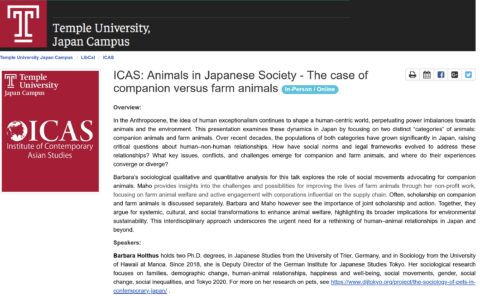
DIJ sociologist Barbara Holthus, together with Maho Cavalier (Uehara), will give a lecture on “Animals in Japanese Society – The case of companion versus farm animals” at Temple University’s Japan Campus on February 20. Addressing power imbalances in a human-centric world towards animals and the environment, their presentation focuses on how companion and farm animals are included in social norms and legal frameworks of human and non-human relationships in Japan. Barbara’s sociological qualitative and quantitative analysis explores the role of social movements advocating for companion animals, while Maho provides insights into the challenges and possibilities for improving the lives of farm animals through non-profit work. Their talk is part of Temple’s Institute of Contemporary Asian Studies’ lecture series and takes place onsite and online. Details and registration here
Book by Dolf Neuhaus on Korean-Japanese Interactions and Japanese Colonial Rule in Korea
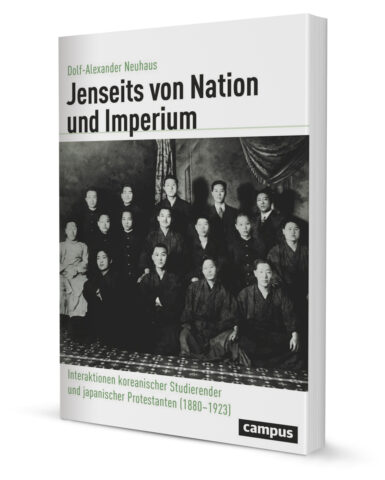
What role did Korean students who came to Japan between 1880 and 1923 play in the discourse on Japan’s colonial and East Asian policies? How did their encounter with Japanese intellectuals of Protestant faith, especially in the environment of the YMCA and the Imperial University of Tokyo, influence their views? Drawing on a wide range of Japanese and Korean sources, Dolf-Alexander Neuhaus‘ new book Jenseits von Nation und Imperium. Interaktionen koreanischer Studierender und japanischer Protestanten (1880–1923) (Beyond nation and empire. Interactions between Korean students and Japanese Protestants, 1880-1923) examines how these students and intellectuals discussed Japanese colonial rule in Korea and the ‘Korean question’ and how their exchange of ideas influenced Japanese and Korean perceptions of empire, nation, and East Asia. The book is based on Dolf’s doctoral dissertation and is published by Campus in the Global History series.
Season’s Greetings and best wishes for the New Year
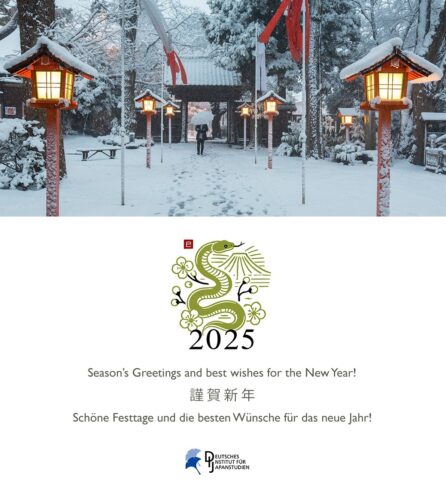 Das Deutsche Institut für Japanstudien wünscht erholsame und frohe Festtage und einen guten Start in ein erfolgreiches Jahr der Schlange!
Das Deutsche Institut für Japanstudien wünscht erholsame und frohe Festtage und einen guten Start in ein erfolgreiches Jahr der Schlange!
The German Institute for Japanese Studies wishes you a happy holiday season and a successful Year of the Snake!
ドイツ日本研究所一同、皆様のご多幸と来るべき新年が成功の年になることを祈念いたします。
On-site Study Group “Marriage hunting” in Japan
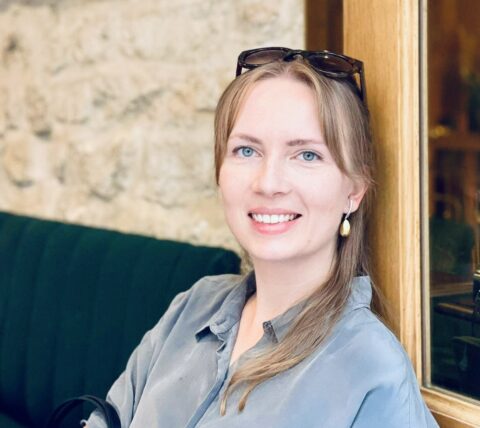
“Marriage hunting” (konkatsu) is a multi-billion-yen industry comprising diverse dating services, from matchmaking apps to marriage agencies. With marriage remaining an important precursor to childbearing, the Japanese government has increasingly invested in “marriage support” to address population decline and aging. This talk draws on data from twenty-seven months of research in Japan, including more than 150 interviews with market professionals and their male and female clients, participant observation of marriage-hunting events, and documentary evidence, to explore the various collaborations between the private and public sector in marriage promotion efforts. The speaker suggests that these alliances constitute a new form of intimate governance which regulates how individuals enter and conceptualize romantic and familial relationships. Details and registration here
Online Study Group on Hypogamy and Traditional Household Attitudes

This presentation examines the relationship between educational hypogamy and life satisfaction within the realm of traditional norms in Japan. Educational hypogamy in this context refers to women who have attained a higher level of education than their husbands. Using Japanese Panel Survey of Consumers data the analysis reveals a significant negative correlation between hypogamy and life satisfaction in traditional households, where men often adhere to inflexible labor market roles and limited engagement in household chores. The findings suggest that hypogamous women experience lower life satisfaction, potentially due to increased burdens in balancing household and labor market responsibilities. In contrast, women in non-traditional households exhibit no such negative association, and in some cases, hypogamy positively correlates with life satisfaction. The talk contributes to discussions on gender roles, household economics, and well-being from a perspective rooted in household and labor economics. Details and registration here
Online Study Group explores Socio-Technical Futures in Japan
 This talk explores how laypeople and experts in Japan assess the role of technology in a desirable future. It will introduce two separate studies, spotlighting perceptions on two different streams of technology with two different stakeholder groups: laypeoples’ perceptions of generative artificial intelligence (genAI) and experts’ perspectives on cybernetic avatar (CA) technology. Both studies draw on a Research through Design (RtD) inspired Futuring approach, carried out through workshop formats. RtD refers to generating knowledge through the act of designing, while Futuring broadly refers to a set of approaches to strategically think about future developments and their (social) implications. This talk spotlights how the role of technology is anticipated by different stakeholders in Japan and sheds light on attitudes and values driving these socio-technical imaginations. Details and registration here
This talk explores how laypeople and experts in Japan assess the role of technology in a desirable future. It will introduce two separate studies, spotlighting perceptions on two different streams of technology with two different stakeholder groups: laypeoples’ perceptions of generative artificial intelligence (genAI) and experts’ perspectives on cybernetic avatar (CA) technology. Both studies draw on a Research through Design (RtD) inspired Futuring approach, carried out through workshop formats. RtD refers to generating knowledge through the act of designing, while Futuring broadly refers to a set of approaches to strategically think about future developments and their (social) implications. This talk spotlights how the role of technology is anticipated by different stakeholders in Japan and sheds light on attitudes and values driving these socio-technical imaginations. Details and registration here





 Open Access
Open Access
